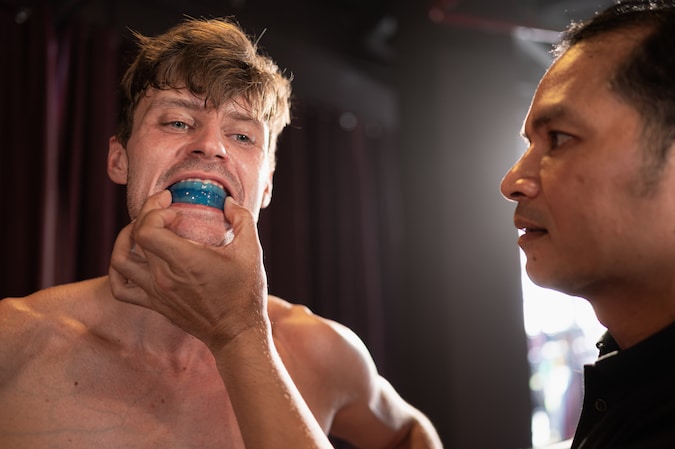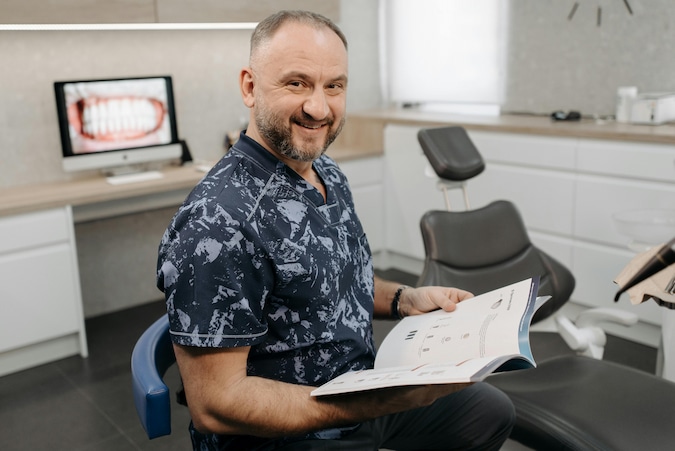
Protect Your Teeth from Damage with These Simple Tips

In sports or daily activities, dental injuries can happen unexpectedly. To protect your teeth from damage, it’s essential to use protective gear like mouthguards and follow other practical tips for avoiding dental trauma. Visit SelfGood to explore comprehensive dental insurance plans that help cover the costs of any unexpected dental treatments you may need.
Dental injuries are common in contact sports, high-speed activities, and even during everyday tasks. Prevention is key, and with proper care, you can protect your teeth from damage and avoid costly restorative treatments. SelfGood is here to provide expert advice on protecting your smile and maintaining long-term oral health.
Key Takeaways:
- Dental injuries can happen during sports or daily activities.
- Wearing mouthguards and using protective gear can prevent dental trauma.
- Proper nutrition and regular dental care strengthen teeth and reduce the risk of injury.
- Immediate care after a dental injury can save teeth and prevent complications.
Understanding Common Dental Injuries

Dental injuries are more common than many people realize. A tooth fracture or displacement can happen from a simple fall or during high-intensity sports. Knowing the different types of dental injuries will help you recognize when to seek care and how to avoid such trauma.
The most frequent types of dental injuries include:
- Fractured or cracked teeth: Teeth can break from high-impact activities or even from biting hard objects.
- Knocked-out teeth: Known as avulsion, this occurs when a tooth is completely dislodged, often during contact sports.
- Tooth displacement: This happens when a tooth is pushed out of alignment, requiring immediate dental care.
- Soft tissue injuries: Your gums, lips, and tongue are vulnerable to injury during physical activities.
Understanding the causes and effects of these injuries will allow you to take proactive steps to prevent them.
High-Risk Activities for Dental Injuries
Not all sports are equally risky for your teeth. Contact sports such as football, hockey, and boxing pose a higher risk due to their physical nature. However, other activities like cycling, skateboarding, or even recreational basketball can also lead to dental trauma.
High-impact or high-speed activities, such as gymnastics or skiing, also present a significant risk. In some cases, even casual activities like jumping on a trampoline can result in unexpected accidents that affect your teeth. It’s crucial to know which activities have a higher risk of dental injury so you can be adequately prepared.
The Role of Mouthguards and Protective Gear
Wearing a mouthguard is one of the best ways to prevent dental injuries during sports. Mouthguards cushion your teeth against impact and reduce the chance of fractures or avulsions. There are three main types of mouthguards to consider:
- Stock Mouthguards: Pre-formed and ready to wear but offer limited protection due to their poor fit.
- Boil-and-Bite Mouthguards: Customizable after boiling and shaping to your teeth. These offer better protection than stock mouthguards.
- Custom-Fitted Mouthguards: Made by a dentist to fit your mouth precisely, providing the highest level of comfort and protection.
Mouthguards absorb the shock of impacts, safeguarding your teeth and gums. If you’re involved in any high-risk sport or activity, a custom-fitted mouthguard is your best option for optimal protection.
Besides mouthguards, consider other protective gear such as helmets and face shields in high-impact sports. For activities like nighttime teeth grinding (bruxism), bite splints are essential for preventing wear and damage to your teeth.
Strengthening Your Teeth for Long-Term Protection
Strong teeth are less likely to be injured. Maintaining strong teeth involves proper nutrition and daily dental care. Nutrients like calcium, vitamin D, and phosphorus are vital for keeping your teeth healthy and resilient. Incorporate dairy products, leafy greens, and fortified foods into your diet to strengthen your enamel.
In addition to nutrition, regular brushing and flossing are essential for maintaining strong teeth. Fluoride toothpaste helps harden enamel, making it more resistant to decay and fractures. For extra protection, ask your dentist about fluoride treatments or sealants, especially if you’re prone to cavities.
What to Do After a Dental Injury
Despite your best efforts, dental injuries can still happen. Knowing how to respond immediately can save your tooth and prevent further damage:
- For fractured or cracked teeth: Rinse your mouth with warm water and apply a cold compress to reduce swelling. Avoid chewing with the injured tooth and visit your dentist promptly.
- For knocked-out teeth: Pick up the tooth by the crown, rinse it gently, and attempt to reinsert it into the socket. If this isn’t possible, store the tooth in milk or a tooth preservation solution and get to a dentist within 30 minutes for the best chance of saving it.
- For displaced teeth: Gently reposition the tooth if possible and seek emergency dental care.
Acting quickly in the event of a dental injury can significantly improve the outcome.
Long-Term Recovery and Care After a Dental Injury

Once a dental injury is treated, proper long-term care is essential for recovery. Depending on the severity of the injury, you may need restorative procedures such as crowns, veneers, or implants. Your dentist will guide you on how to care for the repaired tooth.
During recovery, avoid hard or sticky foods that could aggravate the injury. Good oral hygiene is vital for preventing infection and ensuring that your dental work lasts. If you’ve had a knocked-out tooth reinserted or undergone a repair, follow your dentist’s instructions carefully to avoid reinjury.
Preventing Future Dental Injuries
Preventing future dental injuries involves building protective habits. Always wear your mouthguard during sports and use proper protective gear when necessary. Regular dental checkups are vital to monitor your teeth’s health and ensure they’re strong and resistant to injury.
Additionally, avoid risky behaviors like opening bottles with your teeth or chewing on hard objects, which can weaken or damage your enamel.
Final Thoughts
Preventing dental injuries is not only about wearing a mouthguard but also involves maintaining strong teeth and following best practices for long-term protection. Whether you’re an athlete or just going about your day, taking simple precautions can save you from pain, costly treatments, and lasting damage to your teeth.
Remember, protecting your teeth today will pay off in the future by keeping your smile healthy and strong. Stay proactive by using mouthguards, maintaining good oral hygiene, and following dental care advice to avoid dental injuries.
Frequently Asked Questions
What should I do if my tooth gets knocked out during sports?
Handle the tooth carefully by the crown, rinse it, and reinsert it into the socket if possible. If not, store it in milk and get to a dentist immediately for the best chance of saving it.
How does a mouthguard protect my teeth?
A mouthguard absorbs the shock of impacts, cushioning your teeth and gums during physical activity, preventing fractures and knocked-out teeth.
Can I play sports after recovering from a dental injury?
Yes, but always wear a mouthguard and other protective gear to prevent reinjury and protect any dental repairs you’ve had done.
Sources:
- Colgate. (n.d.). Nutrition Tips for Stronger Teeth. Colgate Nutrition Tips
- American Dental Association. (n.d.). Dental First Aid. Dental First Aid
- Mouthguard Care Guide. (n.d.). Mouthguard Care Guide




